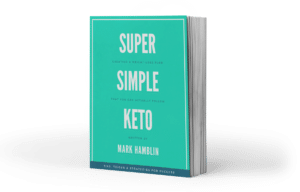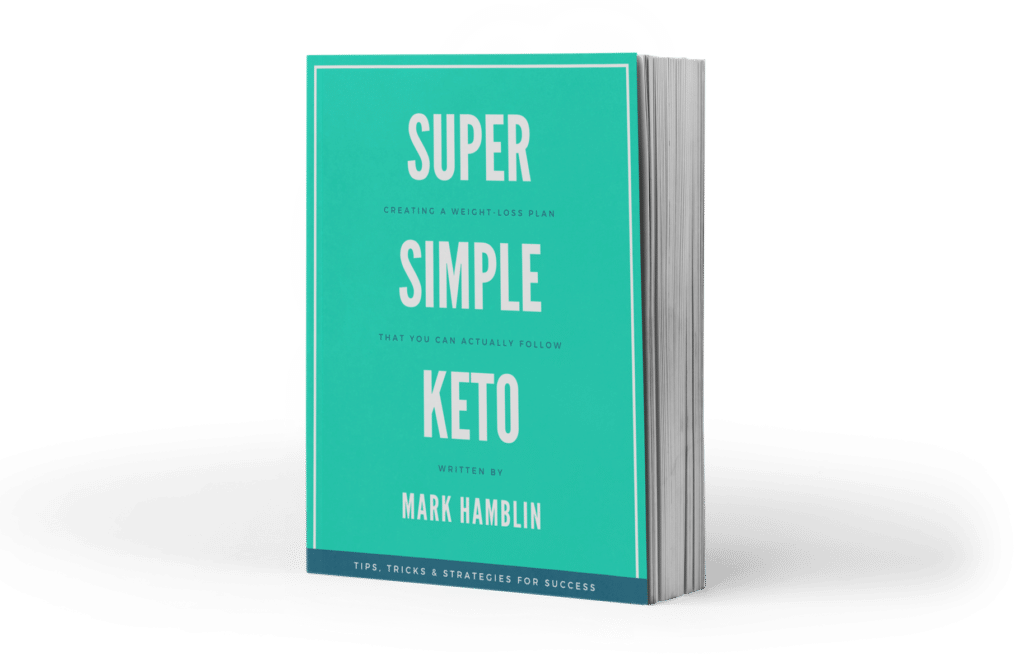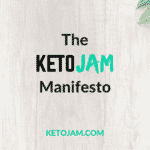The #1 thing I hear from beginners to the Ketogenic Diet is how complicated, confusing and overwhelming it is.
I hear things like:
“There’s so much conflicting information!”
“How can I eat so much fat and still lose fat?!”
“What are all these MCT oils and Ketone supplements everyone is trying to sell me?! Do I need them?” (no, by the way)
or “What’s with this whole butter in my coffee thing? Are you guys nuts?!”
Yeah, I get it.
And I’m sure everyone reading this can relate. If you’re new, you’re probably feeling that way right now. And if you’ve been in the Keto world for a while, I’m sure you can remember back to the mind-twists you went through when you started.
In fact, so many beginners get frustrated and lost that they don’t ever TRY the Ketogenic Diet, not even for a day. They get fed up, and the ditch the idea before even starting, either going back to their old ways, or trying “something more simple” like Whole30, as I heard someone say yesterday in a Facebook group. Understandable.
But why is it so complicated?
Yes, there are lots of reasons. And I think if we break them down, we can see through some of the complexity and start to make some sense of it all. We can then better figure out who and what we should listen to for information, and make a plan that works for our own goals.
I break down the reasons here, and if you’re awesome enough to read all the way to the bottom, I’ll give you some advice for how to sort through the mess…
4 Reasons Why Keto Is So Confusing
1) It’s counterintuitive, based on the decades of low-fat, high-carb food recommendations engrained in our heads.
This is an easy one to grasp. Keto is confusing because it doesn’t follow what most people were taught is “logical” about food and nutrition.
It goes against what our parents told us, what our governments told us, what the big food companies told us (and still try to tell us), and even what “leading scientists” have told us. (Read the story of Ancel Keys and the Seven Countries Study, if you don’t know it already)
When we’re faced with something so new and different from what we’ve been taught, there is bound to be some confusion.
2) There’s big money to be made.
I don’t like calling Keto a “fad” because that has a very bad connotation, and I firmly believe it to be an incredibly healthy way of eating. After all, Keto literally helped save my life.
But I will certainly admit that Keto is “trendy.” Hard to argue that these days.
Just about anything that has even an ounce of proof of promoting weight loss becomes trendy, at least for a while. Remember Olestra? (yuck)
But being trendy doesn’t mean something is bad, it just means it is popular.
And it certainly means that lots of people will jump on the bandwagon. Good people, bad people, in-between people, and certainly lots of “get-rich-quick” people. It happens with any trend, whether its a fashion trend, pop-culture trend, or the still-happening Bitcoin / cryptocurrency trend. (separate topic…)
And there’s no shortage of “get-rich-quick” people jumping on the Keto bandwagon right now. They’re trying to sell supplements promising crazy results, promoting foods or meal plans that aren’t even close to being Ketogenic, and of course there are the MLM (multi-level-marketing) folks who seem to jump on any trend, particularly one in the nutrition industry. (Go watch the documentary Betting on Zero about Herbalife if you haven’t already… not Keto related, but still an eye-opener about MLM companies.)
These “get-rich-quick” folks make money from causing confusion. They want to make everything seem so complex, then sell you some magical pill or potion that makes it all better. They want to sell you a magical shortcut. Certainly there is value in making complex things simple… but not when the solution is completely worthless and actually counterproductive to most people’s goals.
Don’t buy into the Keto version of a snake-oil salesman… the clever ones will probably even try to tell you their snake-oil is made of medium-chain-triglycerides…
3) The science is new, and still being researched.
Us common-folks are not the only ones confused about Keto. The scientist and medical communities are as well. For every legitimate doctor or researcher out there who is studying or practicing with low-carb or Ketogenic Diets, there are still at least 10 more out there who are skeptics.
After all, they still preach the “low-fat, healthy-carb, calorie-restriction” stuff in most medical schools these days.
Why? Because sticking with the “norm” is a safe thing to do.
The Ketogenic Diet has been around for a long time — some would say since the dawn of man, but certainly at least since the 1920’s. And while there are already MANY studies that show its effectiveness, it will be tough to overturn the entrenched dogma without even more cold, hard evidence.
I firmly believe this will change as more research is done, more long-term studies are conducted, and more of the medical “establishment” is disrupted by innovative companies like Virta Health. (A company focused treating type 2 diabetes with the Ketogenic Diet, co-founded by low-carb / Keto pioneers Dr. Phinney and Dr. Volek. Good dudes.)
But until that happens, there is bound to be doubt and confusion even within the medical world.
4) There a gazillion different legitimate reasons why people follow a Ketogenic Diet, and each reason calls for a different variation.
This is one that most people overlook, and I really want you to understand today.
People follow a Ketogenic Diet for so many different reasons. If your definition of Keto is “a way of eating that puts your body into Nutritional Ketosis” (a fair definition) then that encompasses just about all of them… but actually there are many different versions of Keto…. and I’m not just talking about lazy Keto, dirty Keto, and other “social media” buzzwords.
Here are just some of the different reasons people follow a Ketogenic Diet:
- To control epilepsy
- To control PCOS (polycystic ovary syndrome, a hormonal disorder affecting some women)
- To fight cancer
- To control type 2 diabetes and pre-diabetes
- To control ADHD and other mental health issues
- To control various inflammatory conditions
- Endurance athletes, to improve endurance
- Bodybuilders, to prepare for competitions and improve training
- Average health folks, just to “improve mental focus / energy / clarity” (that’s fine by me, but not my main reason for doing it
- Your co-worker Dylan, because he wants to look cool drinking his bulletproof coffee (only half-joking)
- …and lots of people, just to lose weight. (how I found Keto)
This list could go on and on.
And the thing is, each of these different groups of people are going to do Keto a little bit differently. And they should.
The endurance athletes probably NEVER have to worry about how much quantity they eat — they probably can’t get enough.
The type 2 diabetes patients often have to balance their food intake with their medications, making sure they eat very carefully not to allow their medications’ side effects to get out of control, and often never fasting.
The epilepsy patients often have to focus on maintaining high levels of ketone production (and maybe even exogenous ketones) to keep their debilitating symptoms at bay.
And the weight-loss group? Well, they have (or should have) a slightly different version as well.
Each group has a different goal. A different version of Keto. And different answers for questions like “how much should I eat on Keto” and “how much protein” and “should I take ketone supplements?”
But unfortunately, in today’s world of social media echo chambers, Buzzfeed-fueled hype, and “oh-my-god-the-Kardashians-mentioned-Keto”, nobody understands this.
So all of “Keto” gets lumped into one big, messy, and confusing pile…
Certainly tough for a beginner to sort through by doing a few Google searches when he’s just looking for a way to lose 40 pounds, huh?
How To Sort Through The Confusion
The solution is pretty simple, but takes some diligence and effort. It involves using your head a bit… which I know can be scary!
Here’s what I suggest:
1) Know why YOU are doing Keto, and follow people, companies, coaches, and doctors who know how to implement a Ketogenic Diet to meet YOUR goals.
Are you doing Keto for weight-loss, just like the vast majority of people attracted to Keto these days? Then don’t go listening to a podcast from some bodybuilder telling you what you should and shouldn’t do. And you should probably stay away from all the companies selling all the Keto sweets… they might not knock you out of ketosis, but they’ll likely slow down your progress towards your weight loss goals.
Figure out what Keto “camp” you’re in, and stick with people who are doing it for the same reasons.
2) Someone trying to sell you something? Know their angle…
There’s a lot of people popping up on Facebook and Instagram who will provide “free Keto coaching”. Oh really? How nice of you. That should set off some alarm bells.
Most of the time (not all) these people have an ulterior motive — they want to sell you their overpriced, counterproductive, and creepy MLM supplements.
STAY AWAY. If weight loss is your goal (or just about anything, other than a few special cases) you DO NOT need supplements on Keto. (<– You should read that post)
Sometimes the supplement pushers come in other forms, not just MLM companies. They may be internet-famous doctors (some real MDs, some just chiropractors) who sell you on their low-cost “90-Day Plan”, then give you the hard sell on supplements for a whopping $20+ per day. Same goes for all those “celebrity trainers” out there, and even the “famous” Keto companies… they’re all just selling supplements you don’t need!
3) Take time to understand how Keto works. It will make 1000% more sense.
If you can find it on the internet, it must be true, right? It’s amazing how much mis-information is out there about Keto…
Be skeptical. Heck, be skeptical about me! (I’d like to think I can be trusted, but I’ll let you decide.)
While I absolutely hate “diet books,” I do think you should pick up one of the good technical books that explains low-carb and Keto written by the scientists actively researching it.
If there’s one I’d recommend, it is The Art and Science of Low Carbohydrate Living by Dr. Phinney and Dr. Volek. It’s clear, not overly technical, and provides practical information.
I also put together a list of Good Keto Diet Books that you can pick up.
Understanding the underlying fundamentals will open your eyes and help this all make SO much sense.
Keto On
Yes, Keto can be confusing. And that will probably only increase as more people jump on the bandwagon, more “get-rich-quick” types come out of the woodwork, and more social media frenzy spreads questionable information.
But you can be prepared, educate yourself, and follow people you trust.
After all, its is your own health on the line.
Take care of it.
Keto on, my friends.
-Mark
CONFUSED ABOUT KETO?
Get a FREE copy of my popular book
SUPER SIMPLE KETO
and stop feeling overwhelmed!

Hi, I'm Mark

I completely changed my life with the Ketogenic Diet, and I started KetoJam to help you do the same.
Read my story.
JOIN THE KETOJAM FAMILY
Subscribe to the KetoJam newsletter for all of our new recipes, program updates, and our exclusive discounts on our training and coaching programs.






